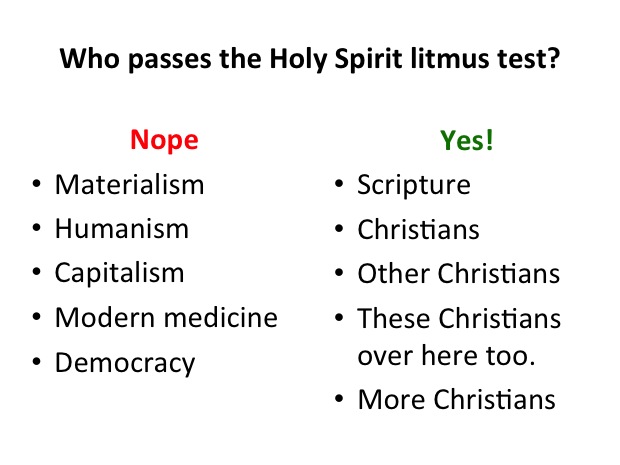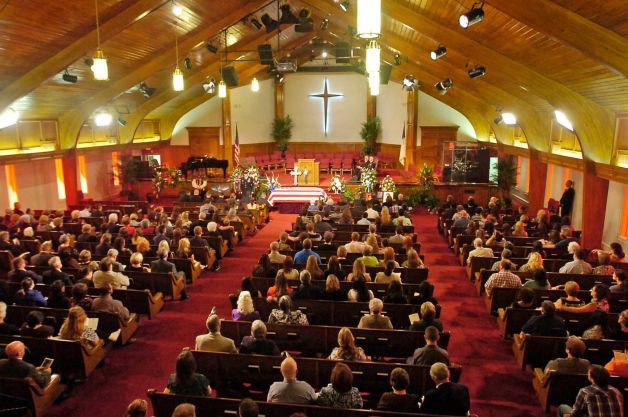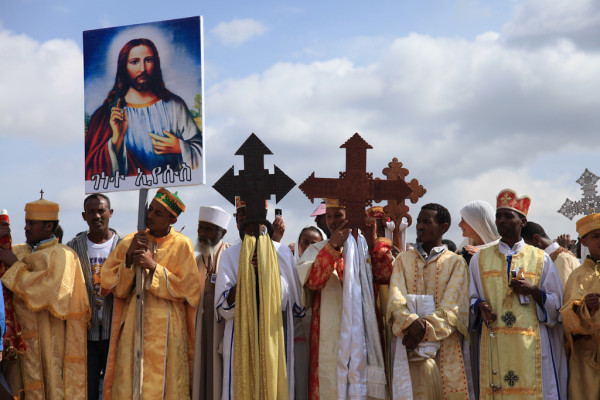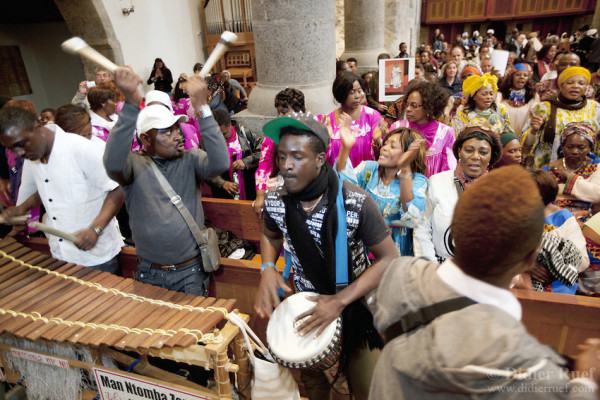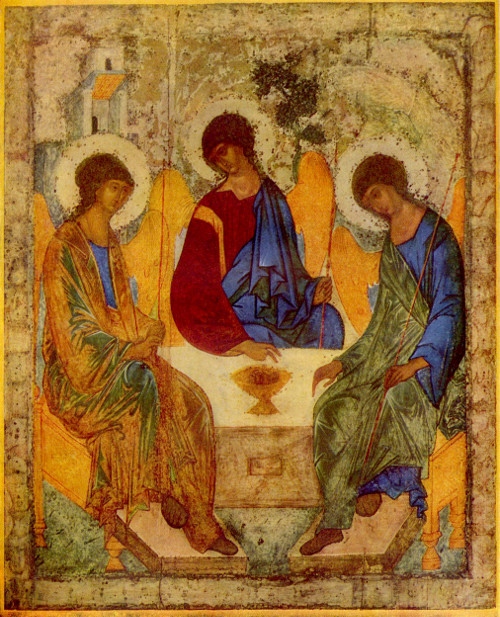I’d like to move on to the next section now, though continue the same line of thought.
Chapter 12 from 1 Corinthians touches on another divisive issue in the church, and that is the place of certain spiritual gifts (as they are called) in the day-to-day life of us believers. Many church bodies, especially in the last century, have decided that things like divine healing and speaking in tongues are really valuable and have emphasized them a lot – encouraging people to try and exercise them. Others have come down hard on the other side, saying that most of these supernatural things spoken of in the New Testament don’t really exist anymore. Others have sought to be inclusive and have left the door open by being intentionally vague on issues regarding spiritual gifts. Anyone know what we do here in this congregation? If you’ve read our statement of faith, you know there is a lot of stuff about Jesus in there, but nothing really, positive or negative, about these kinds of spiritual gifts. We have people of all backgrounds here. I grew up in Baptist circles where the more miraculous gifts were seriously downplayed, though not entirely dismissed. In college though, I benefited immensely from attending a Pentecostal church where these things were always being talked about. I know from speaking to some of you here that we have a lot of people from both these backgrounds and more here today.
So if you’re looking for someone to get into the nitty gritty details about how the Holy Spirit works, I’m afraid you’re out of luck. The analogy most often used for the spirit in scripture is that of a wind. Even Jesus himself describes it this way in John 3:8:
The wind blows where it wishes, and you hear the sound of it, but cannot tell where it comes from and where it goes. So is everyone who is born of the Spirit.
Trying to pin the spirit’s activity down is something that requires a ton a humility and I am not going to try to do that today. But I do want to try to figure out why Paul is giving this advice to his readers, and to us.
Now some might read this passage and say, Oh look, Paul is explaining how spiritual gifts work by giving us a nice tidy little list of them. But this is really just a short list of possible examples. If you look at the context of the letter, he isn’t giving a general exposition on the way the Holy Spirt might manifest himself in Christian’s lives. He, like in all other chapters of 1st Corinthians, is dealing with a specific problem in the church referenced in an earlier letter. In this case, it seems as if some people in the church were acting like they were more important than others because of their spirituality. This is why Paul goes on in the next section to use the analogy of the human body and how not every member of the church can be a hand or an eye and whatnot.
How is this? Well, the Greek word for “spiritual gift” used most of the time in the New Testament is “charismata”. It is where we get the word charismatic. In the secular world these days, someone that is “charismatic” if they have an enthusiastic and attractive personality. In the church though, a “charismatic” is someone who is generally enthusiastic about spiritual gifts, especially speaking in tongues. Now Paul could have used that word here but he instead uses a word that is more general, “pneumatikos” and means “spiritual things” or “spiritual people”.
The point of the passage isn’t to talk about the gifts themselves, or the various manifestations of the spirit themselves, but the people using them or showing evidence of them in their lives. The point is that everyone in the body of Christ is of equal value.
In the world, teachers and professors and held in much higher regard than students. But not so in the Kingdom of God. Someone who works on a farm or in an office all day is not a second class Christian compared to the “first class” pastor or foreign missionary. That’s nonsense and Paul is always trying to straighten us out on that. It’s not a sliding scale between plain and cool, but rather like different important parts of a physical body working together.
The same goes for spiritual giftings as it does for vocation. Someone who prophecies and might see visions from God is not more (or less) special than the person who just studies the word or even the guy that cleans the toilet. (Hopefully the same guy does all three!) A woman who has been given a lot of faith – and when she prays for sick people they get well – that person is not a first class Christian over the 2nd class Christian mother who stays by a feverish child throughout the night administering cold cloths and comforting words.
Here is another example. Two Christians kneel down to pray and ask God for forgiveness and to thank him and commune with him. One has an ecstatic experience – feeling almost literally wrapped in the arms of Christ. The other feels nothing much at all but finds himself less affected by temptation the next day, to his relief. How did both things happen? The Holy Spirit, the spirit of Christ today, breathing on each of them. He breathes on us too, but it looks a little different, sometimes a lot different, for each individual.
As the passage from today says, different gifts, same spirit. Different ministries, different jobs, same Lord, different activities, same God.
Now you may be saying, wait just a minute. Lot of people call themselves Christians and have got pictures of Jesus all over the place, but they seem to have some terrible problems and don’t seem to be following him much at all. What about the churches here in America who are trying to normalize homosexual behavior? Some of them even have gay and lesbian priests or pastors. Are you saying their cool too? Well, no, I’m not. Go back to our litmus test for a while. Did Jesus Christ, the God-Man come in the flesh? What’s really interesting throughout history is that when a church body or tradition starts to slide into sin or heresy in some way, what they say about the nature of Jesus slips at exactly the same time. It might not seem connected at first glance, but if you get digging you will find that a confident proclamation of the risen historical Jesus sneaked right out the back door as the capitulation to political correctness and liberal tolerance came in the front door. In churches where there is little to no sexual ethic preached, you will find that Jesus has become mostly just a nice abstract idea. Maybe he was just a spirit. Maybe he was just an invention of Paul or the other well-meaning apostles. This kind of mystical non-fleshly Jesus gets a lot of air time on NPR and public television documentaries and such. He starts showing up wherever authority of scripture is tossed aside. Why? Well, if what you do with your BODY, with your sexual parts, or with the unborn baby inside you, if those things don’t really matter, then to stay a Christian, you HAVE to have a Jesus who doesn’t really have a body either. You can’t have a messy bloody Jesus on a cross and then have him really walking around the middle east alive a few days later. That would imply what you do with your own flesh might be of some consequence. This idea of God coming in the flesh in Jesus is what theologians call the incarnation. You will find that wherever teaching on the incarnation gets mushy, trouble is close at hand. It’s been happening on and off, here and there, for the last two millennia. Our day and age is no different.
But for those who are still faithful to Christ, I would urge you to treat them as brothers and sisters, not as rivals on the playground. Love and accept the other Christians in town. Play nice with them. Praise them! Pray for them. Be happy when things go well for them. Be sad when they face adversity.
Frankly, I think that is one our strengths here.. We have made friends with a lot of other bodies of believers in the region and by not being too dogmatic about the way we “do church”, we’ve been able to keep those friends. Here are a few examples:
- Celebrate Recovery is an interdenominational ministry that meets here on Friday nights. It’s not run by our pastors, but they use our building and kitchen and we give them money to keep it running.
- Men from the local Evangelical Free church come to our men’s retreat. On the flip side, we encourage people here to attend marriage seminars at E-Free and also the special services put together on days like Good Friday.
- We have a lot of bible studies and small groups meeting throughout the week and it’s not unusual to see people from other churches around town attend some of them. At the same time, some us attend meetings put on by other groups. Neither has to feel threatened.
- We don’t try to do everything. We don’t have a college ministry. There is Cru and other people doing a good job at that. The guy who runs Cru locally happens to attend here, but a lot of his students go to other churches and believe slightly different things.
- Pastor K. has is office downtown at the theater where many other churches meet. He provides counseling services for folks from all over, many of them who don’t go to church here.
- Pastor L. at the local classical Christian school, which is largely run by one other church, but people from over 20 different churches in the area send their kids there. At the same time, we have lots of homeschooling families here as well as some that send their kids to the public schools. You don’t have to do one thing or the other to be accepted or approved around here. We trust you know what you are doing with your family, even if it’s not the same thing some of the rest of us are doing.
- Several churches around here put on Vacation Bible Schools during the summer. Occasionally we too. Parents from all around cross lines to send their kids or to even volunteer.
- People from this church often make a showing at interdenominational events like the Right to Life march we had downtown just a few weeks ago. Tim and his family often help out with those. Things like that are good opportunities to get out and meet your neighbors from other Christian traditions and show some solidarity.
A notable portion of our budget goes to the local crisis pregnancy center, which nearly all the churches in town also support.
You can participate in this too. That’s what I would like you to take away from this message today.
We are just humans. Our minds and bodies are limited. We only have so much time in the day and only so much energy. We only have so much fight in is. Don’t waste your days and your brain cells fighting with other Christians. Don’t fight with your brothers. Don’t hate on your sisters. Don’t hate on your parents either, even if they wish you had stayed in the Christian denomination you grew up in or maybe never joined one at all.
You can do this by not trash-talking other Christians, even if you think some of their practices are strange, or silly, or maybe even harmful. Seek to understand them instead and give them the benefit of the doubt. Assume they love Jesus even if their devotion looks quite a bit different from yours. That’s a much better place, and a more Biblical place to start than with fear and suspicion until proven otherwise. If friends you have here leave and go to a different church, then stay in touch with them and don’t write them off. Ask yourself, “How can my community be enlarged?” Not, “How can I make my list of friends smaller and more selective?” Visit other churches sometimes especially when they are putting on a special event or conference. You’ll almost definitely learn something new and probably make a friend or two. The world is big. Don’t just stay in your own little ghetto. What we see here on the earth are just expressions of people trying to follow him and the holy spirit working in their hearts in unexpected ways.
You know, when I was young I used to think that if all the problems in the church were fixed, we would all be one giant group – the only source of division we be geography. Every city would have one big church with every last single Christian in town all meeting at the same joint to worship. Now though, I realize that is a silly and unsustainable idea. The city would need to be made of gold and filled with endless light and that time has not yet come. I think God loves diversity. He made so many different kinds of crazy animals and even us humans look so different from one another. I confess, I didn’t used to think people of other races were that beautiful, but now that I have a couple of adopted children of different races, gosh, I think they look fantastic. Africans, Asians, Latin Americans, aren’t they all so cool? Now I think, the more Christian churches we have in town, the better. The more variety we have, the more inclusive we can be, the more room there is for everyone, and the more room their is for leaders to step up too. I have some friends who are pastors and church planters and one of the exciting things I see them doing now is that whenever they have a church that gets to be about 200 people, they intentionally split it and start a new congregation on the other side of town. If it continues to grow, then they split it again. And each one evolves to have a different flavor and maybe even a slightly different theology over time. But it’s OK because their eyes are fixed on Jesus. Never becoming large also keeps leaders humble and prevents members from taking things too seriously.
So I hope that all of you, as you go about your lives, working to put a roof over your head or feed your kids and find some friends to confide in, that you stay steadfast in your trust that Jesus Christ has saved you, and is saving you, and is present in some fashion here in the church. Whether you end up staying here for the next 30 years, or move somewhere far away this summer, or anything in-between.
Let us pray.
Lord Jesus Christ, Thank your for loving us, and thank you for making us all so different and beautiful and interesting. Lord, as the psalmist said, “How good and pleasant it is for brothers to dwell together in unity.” God, I pray that we might not think of ourselves more highly than we ought, but at the same time be utterly convinced of the death and resurrection of your son, not budging an inch on that to accommodate any passing fad or fit into any crowd. Father, teach us ways to love our Christian brothers and sisters and send your Holy Spirit to soften our hearts so that we may actually do so. In your name we pray Jesus, Amen.

